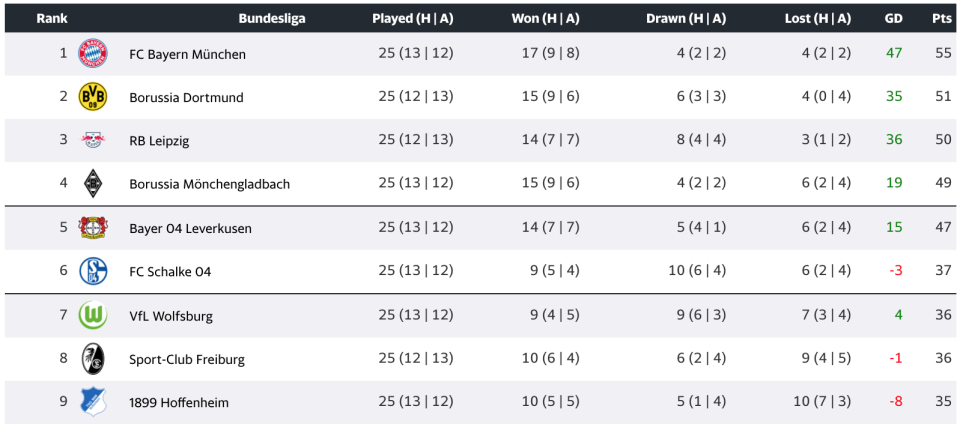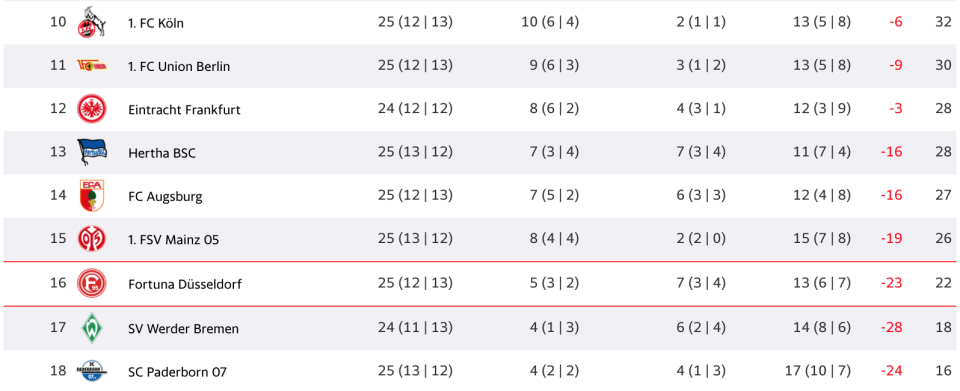A starving sports fan's guide to German Bundesliga soccer, which is nearing a return

It has been almost two months since a game in a major, internationally watched, widely popular professional sports league was played.
That’s by far the longest drought since “internationally watched sports league” became a thing. It’s a relatively insignificant concern amid the coronavirus pandemic that could kill a million people and upend the lives of many more. But it’s an inconvenience nonetheless. It has millions of fans longing for something, anything, to enjoy.
And, if all goes to plan in Germany over the next 10 days, the drought is about to end.
The Bundesliga, Germany’s top soccer division, and probably the third-best league in the world’s most adored sport, got clearance from government officials on Wednesday to return as soon as May 15. Skepticism and safety concerns remain. Fans will be absent. But officials will convene Thursday to nail down a restart plan.
Which means you will have sports to watch in the near future. And if you don’t know a single thing about the Bundesliga … well, that’s what we’re here for. Let’s get you learned.
Bundesliga basics
The Bundesliga is an 18-team, single-table, balanced-schedule circuit. There are no conferences or playoffs. There are 34 games per team – one home, one away against each opponent – to decide a champion. (And to decide Champions League qualification and relegation. More on that later.)
You get three points for a win, one for a draw, zero for a loss, and the team with the most points at the end of the season wins the title. It’s beautifully simple.
Where are we in the season?
We’re 25 games in, with nine to go. Here’s what the standings – or table, as Europeans call it – look like at the top:

It’s the tightest multi-pronged title race of any major European league this season. And the Bundesliga will jump right back in for the stretch run.
Who are the best teams?
Bayern Munich has won seven consecutive titles. Which stinks. Success in European soccer, where there are no salary caps, becomes a virtuous cycle of increased revenues —> more spending power —> better players —> more success. The title is Bayern’s to lose – this year, and every year.
Which makes an actual title race all the more compelling. Borussia Dortmund is the second-best team and the people’s champion, with a rabid fan base, exciting young stars and a legitimate chance to challenge Bayern over the remaining nine games. Striker Erling Haaland is the best teenager on the planet.
RB Leipzig, on the other hand, is largely despised in Germany for complicated reasons. But it plays exciting soccer, and would be the first club from the former East Germany to win the Bundesliga if it can make up the four-point gap.
Borussia Monchengladbach, meanwhile, would be in second if not for a couple last-minute collapses over the winter. Bayer Leverkusen is also fun as hell. You can’t go wrong watching the top five.
When are the games, and how can I watch?
We don’t yet know whether the Bundesliga will follow a standard weekly schedule or overhaul it to suit extraordinary circumstances. We do know, however, where you’ll be able to watch.
Fox Sports has U.S. broadcast rights to the league. Most games are on FS1, FS2 and Fox Deportes. All are on Fox Sports Go if you sign in via your cable provider.
Under normal circumstances, there are nine games every weekend, and five or six are televised. Friday kickoffs are typically 2:30 p.m. ET. Saturday is 9:30 a.m. and 12:30 p.m. Sunday is similar. The times are all relatively convenient.
Oh, and by the way: Unlike in American sports, the games actually start precisely on time – if the schedule says noon, kickoff happens at noon. And they almost always last a little under two hours.
Who should I root for?
Funny you should ask. My brother presented a similar question to me several months ago. I had most of Europe’s big five leagues to choose from ... and I picked Borussia Monchengladbach for him.
Strong fan base. Community ties. Interesting (and sometimes bats—t insane) soccer. Organic process. Upstart success. If you want to jump aboard, you can even send them $20; they’ll give some of the money to good causes and locals in need; they’ll use the rest to make a plastic cutout of you and put it in their otherwise empty stadium during games.
What would you do to support your team during the #coronavirus crisis?@borussia_en fans want to make sure that if the Bundesliga resumes behind closed doors, their club will still have a crowd.#BMG 🖤💚 pic.twitter.com/4IaOlJmVbE
— DW Sports (@dw_sports) April 30, 2020
The only real rule for picking a club, though, is don’t front-run and support Bayern Munich. And if you’re looking for somebody to supplant them, Borussia Dortmund is your best bet. If you pick Leipzig, you’re also supporting a massive corporation, Red Bull. If you pick Leverkusen, you’ll probably find your slim title hopes fading quickly.
There’s one other consideration, however, that could sway rooting interests ...
Are there any American players?
There sure are! Plenty, actually. More than in any other league outside North America. Arguably four of the five most exciting USMNT youngsters play in the Bundesliga.
Tyler Adams, who’s 21 years old, is the best of the bunch, and is a regular at Leipzig. He recently spoke with Yahoo Sports’ Doug McIntyre and other reporters about preparing for the Bundesliga’s relaunch.
Weston McKennie, 21, is close behind Adams, and is one of Schalke’s better players. Josh Sargent, 19, is a striker at Werder Bremen. Gio Reyna, 17(!), has recently broken into lineups at Borussia Dortmund, and did this in one of his first games:
There’s also defender John Brooks at Wolfsburg – the USMNT’s best center back when healthy. Fabian Johnson comes off the bench for Monchengladbach. Timmy Chandler gets consistent time at Eintracht Frankfurt. Alfredo Morales is a midfield mainstay at Fortuna Dusseldorf. U.S. No. 1 goalkeeper Zack Steffen also plays at Dusseldorf, but recently suffered a knee injury in training and is out for the foreseeable future.
Oh, and there’s Chris Richards. He’s a 19-year-old American defender at Bayern Munich. He hasn’t ascended to the first team yet, but appears close. If he does, the “don’t root for Bayern” rule goes out the window.
If Bayern runs away with the title, does it get boring?
No! Because there’s more to play for than just the title.
The difference between fourth place and fifth is a spot in next season’s Champions League – whenever that happens, if it happens. The Champions League is a pan-European annual tournament and the most prestigious club soccer competition in the world. In short, it’s a big deal. The top four from the Bundesliga qualify, and as things stand, there are five teams scrapping for those four spots. (See above.)
There’s also the other end of the standings ...

Every season, the bottom two teams get relegated to the second division. Two from the second division get promoted to the Bundesliga. Third-worst plays third-best in a playoff for the final spot in next year’s Bundesliga. (All of this: also a big deal!)
So if you want drama, hey, maybe adopt Josh Sargent’s Werder Bremen as your squad and emotionally invest yourself in a scrap for top-flight survival.
Soccer basics
If you’re a soccer novice, we covered many of the basics ahead of the men’s World Cup two years ago. And here’s how all of that relates to the club game – which, tentatively, is on the verge of resumption. Dig in and enjoy.
More from Yahoo Sports:



